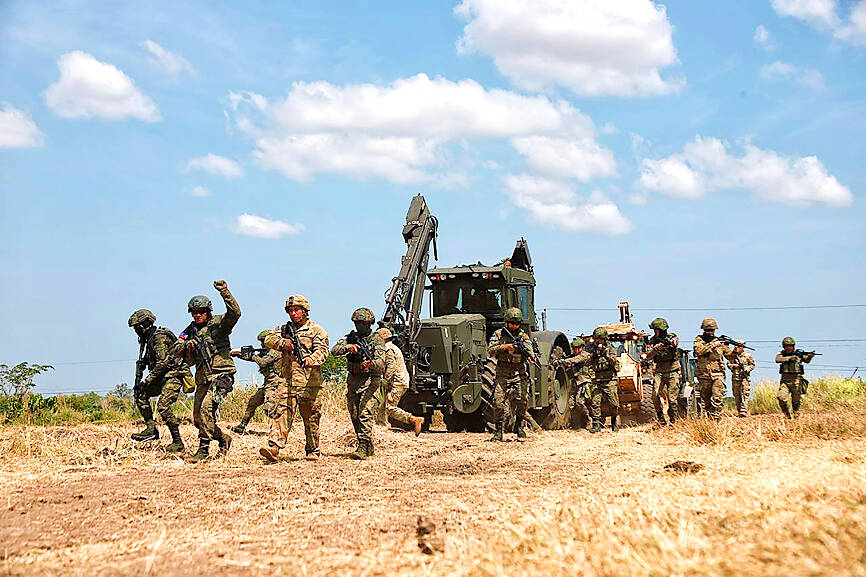A recent survey commissioned by the Institute for National Defense and Security Research (INDSR) showed that 55 percent of Taiwanese thought the US would send forces to defend the nation against an invasion, while 37 percent believed no aid would come.
The serial poll conducted through March by the Election Study Center of National Chengchi University suggested that US skepticism in Taiwan has waned after peaking last year, analyst Liu Shu-ting (劉姝廷) wrote in a blog post on the INDSR’s Web site on Wednesday.
About 60 percent of respondents disagreed with the statement that accepting US military aid would lead to war for Taiwan, while 39 percent of respondents expressed agreement, Liu said, citing the poll.

Photo courtesy of the Philippine Army via CNA
Meanwhile, about 29 percent of Taiwanese believe that China is expected to be the most serious national security threat to Taiwan over the next five years, and almost no respondents believed that incitement to war by the US is a threat, the poll said.
The earliest INDSR poll in the series conducted in September 2021 showed that 57 percent of Taiwanese believed the US would militarily defend Taiwan, while 34 percent believed it would not, she said.
An INDSR’s polling in March last year showed that 40 percent of respondents said the US would use military force to defend Taiwan, while 49 percent said Washington would not, she said.
In August of that year, another INDSR poll revealed that 49 percent of Tawainese believe the US would militarily defend Taiwan, while 40 percent of them did not, Liu said.
These trends show that Taiwanese public confidence in direct support from the US in the event of war has reverted to levels from two years ago, she said.
Taiwanese confidence in the US likely fell due to the latter’s withdrawal from Afghanistan in 2021, but was restored by Washington’s continued aid to Ukraine following the Russian invasion last year, Liu said.
Increasing media literacy and awareness of disinformation in Taiwan likely contributed to the declining skepticism toward the US, which is a component of Beijing’s cognitive warfare campaign to split the US-led alliance of democracies on a global scale, she said.
Beijing’s endorsement of French President Emmanuel Macron’s message of Europe’s strategic autonomy is an example of the Chinese effort to divide the US and its allies, Liu added.
More than 30 percent of respondents persistently voiced doubts about the US commitment to defend Taiwan across the four polls, suggesting a strong disagreement about the US and its values among Taiwanese, she said.
Policymakers are urged to focus communication on the nation’s values, ideals and narratives instead of a transformation of public perceptions about the US, Liu said, adding that US skepticism is best countered by challenging its meaning and implications.
Promoting the view that Taiwan must have the strength to defend itself before seeking aid from allies, via a parallel with Ukraine, would also effectively counter Beijing’s efforts to discredit the US, she said.
The poll — which was conducted via landlines and mobile phones — gathered 1,535 valid samples among adults residing in Taiwan proper. The survey has a 95 percent confidence level and a margin of error of 2.5 percent.

SECURITY: As China is ‘reshaping’ Hong Kong’s population, Taiwan must raise the eligibility threshold for applications from Hong Kongers, Chiu Chui-cheng said When Hong Kong and Macau citizens apply for residency in Taiwan, it would be under a new category that includes a “national security observation period,” Mainland Affairs Council (MAC) Minister Chiu Chui-cheng (邱垂正) said yesterday. President William Lai (賴清德) on March 13 announced 17 strategies to counter China’s aggression toward Taiwan, including incorporating national security considerations into the review process for residency applications from Hong Kong and Macau citizens. The situation in Hong Kong is constantly changing, Chiu said to media yesterday on the sidelines of the Taipei Technology Run hosted by the Taipei Neihu Technology Park Development Association. With

CARROT AND STICK: While unrelenting in its military threats, China attracted nearly 40,000 Taiwanese to over 400 business events last year Nearly 40,000 Taiwanese last year joined industry events in China, such as conferences and trade fairs, supported by the Chinese government, a study showed yesterday, as Beijing ramps up a charm offensive toward Taipei alongside military pressure. China has long taken a carrot-and-stick approach to Taiwan, threatening it with the prospect of military action while reaching out to those it believes are amenable to Beijing’s point of view. Taiwanese security officials are wary of what they see as Beijing’s influence campaigns to sway public opinion after Taipei and Beijing gradually resumed travel links halted by the COVID-19 pandemic, but the scale of

A US Marine Corps regiment equipped with Naval Strike Missiles (NSM) is set to participate in the upcoming Balikatan 25 exercise in the Luzon Strait, marking the system’s first-ever deployment in the Philippines. US and Philippine officials have separately confirmed that the Navy Marine Expeditionary Ship Interdiction System (NMESIS) — the mobile launch platform for the Naval Strike Missile — would take part in the joint exercise. The missiles are being deployed to “a strategic first island chain chokepoint” in the waters between Taiwan proper and the Philippines, US-based Naval News reported. “The Luzon Strait and Bashi Channel represent a critical access

Pope Francis is be laid to rest on Saturday after lying in state for three days in St Peter’s Basilica, where the faithful are expected to flock to pay their respects to history’s first Latin American pontiff. The cardinals met yesterday in the Vatican’s synod hall to chart the next steps before a conclave begins to choose Francis’ successor, as condolences poured in from around the world. According to current norms, the conclave must begin between May 5 and 10. The cardinals set the funeral for Saturday at 10am in St Peter’s Square, to be celebrated by the dean of the College